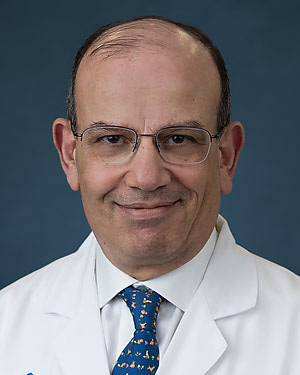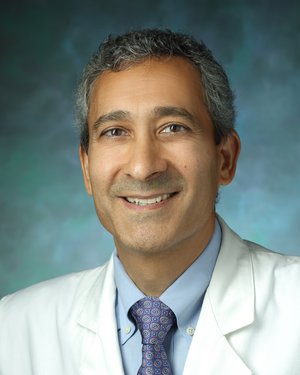Research Lab Results
-
Christopher Chute Lab
Work in the Christopher Chute Lab involves the management of clinical data to enable effective evidence-based clinical practice and translational research. Recently, we developed an EHR-based genetic testing knowledge base to be integrated into the genetic testing ontology (GTO) and identified potential barriers to pharmacogenomics clinical decision support (CDS) implementation. -
Clifton O. Bingham III Lab
Research in the Clifton O. Bingham III Lab focuses on defining clinical and biochemical disease phenotypes related to therapeutic responses in rheumatoid arthritis and osteoarthritis; developing rational clinical trial designs to test new treatments; improving patient-reported outcome measures; evaluating novel imaging modalities for arthritis; and examining the role of oral health in inflammatory arthritis.
-
Gabsang Lee Lab
Human induced pluripotent stem cells (hiPSCs) provide unprecedented opportunities for cell replacement approaches, disease modeling and drug discovery in a patient-specific manner. The Gabsang Lee Lab focuses on the neural crest lineage and skeletal muscle tissue, in terms of their fate-determination processes as well as relevant genetic disorders. Previously, we studied a human genetic disorder (familial dysautonomia, or FD) with hiPSCs and found that FD-specific neural crest cells have low levels of genes needed to make autonomous neurons--the ones needed for the ""fight-or-flight"" response. In an effort to discover novel drugs, we performed high-throughput screening with a compound library using FD patient-derived neural crest cells. We recently established a direct conversion methodology, turning patient fibroblasts into ""induced neural crest (iNC)"" that also exhibit disease-related phenotypes, just as the FD-hiPSC-derived neural crest. We're extending our research to the neural crest's neighboring cells, somite. Using multiple genetic reporter systems, we identified sufficient cues for directing hiPSCs into somite stage, followed by skeletal muscle lineages. This novel approach can straightforwardly apply to muscular dystrophies, resulting in expandable myoblasts in a patient-specific manner. -
DNA Diagnostic Lab
Established in 1979, the Johns Hopkins DNA Diagnostic Laboratory is a CLIA and CAP certified; Maryland, New York, and Pennsylvania licensed clinical genetics testing laboratory specializing in rare inherited disorders. Led by renown professor of pediatrics and medical genetics Dr. Garry R. Cutting, the lab offers testing for a range of approximately 50 phenotypes and disorders totaling 3,500 tests annually. -
Daniel Weinberger Laboratory
The Daniel Weinberger Laboratory focuses on the neurobiological mechanisms of genetic risk for developmental brain disorders. We study the genetic regulation of the transcriptome in normal human brain across the human life span and in brains from patients with various psychiatric disorders. We also study the impact of genetic variation on aspects of human brain development and function linked with risk for schizophrenia and related psychiatric disorders. Our lab uses unique molecular and clinical datasets and biological materials from a large sample of families with affected and unaffected offspring and normal volunteers. These datasets include DNA, lymphoblast and fibroblast cell lines, and extensive quantitative phenotypes related to genetic risk for schizophrenia, including detailed cognitive assessments and various neuroimaging assays. In other research, we are working on a human brain transcriptome project that is RNA sequencing over 1,000 human brain samples in various regions and based also on sorting of specific celliular phentypes. We are exploring the molecular processing of the gene and its implications for cognition and aspects of human temperament. -
Nauder Faraday Lab
The Nauder Faraday Lab investigates topics within perioperative genetic and molecular medicine. We explore thrombotic, bleeding and infectious surgical complications. Our goal is to uncover the molecular determinants of outcome in surgical patients, which will enable surgeons to better personalize a patient’s care in the perioperative period. Our team is funded by the National Institutes of Health to research platelet phenotypes, the pharmacogenomics of antiplatelet agents for preventing cardiovascular disease, and the genotypic determinants of aspirin response in high-risk families. -
Mohamed Atta Lab
Dr. Atta and his research team explore the epidemiological and clinical interventions of a variety of kidney diseases. Our goal is not only to advance the understanding of many kidney diseases but also to capitalize on novel discoveries of basic science to treat a wide range of rare and common kidney disorders.
- Multi-international observational study of a rare form of amyloid (LECT2 amyloid) to understand its natural history with the ultimate interest of treating this condition.
- Our group has launched a project investigating the impact of COVID19 on the kidney to identify risk factors influencing outcome across different clinical phenotypes
- In collaboration with the Division of Infectious Diseases and the School of Public Health, our research has focused on the epidemiology of HIV and kidney disease. We also study clinical markers and contributing factors in the progression of kidney disease, and the association between kidney disease and heart disease.
- Our research group is participating in a multicenter consortium serving as a clinical core site to study the pathogenesis of HIV-associated kidney disease by providing well-characterized clinical specimens and corresponding clinical and laboratory data.






